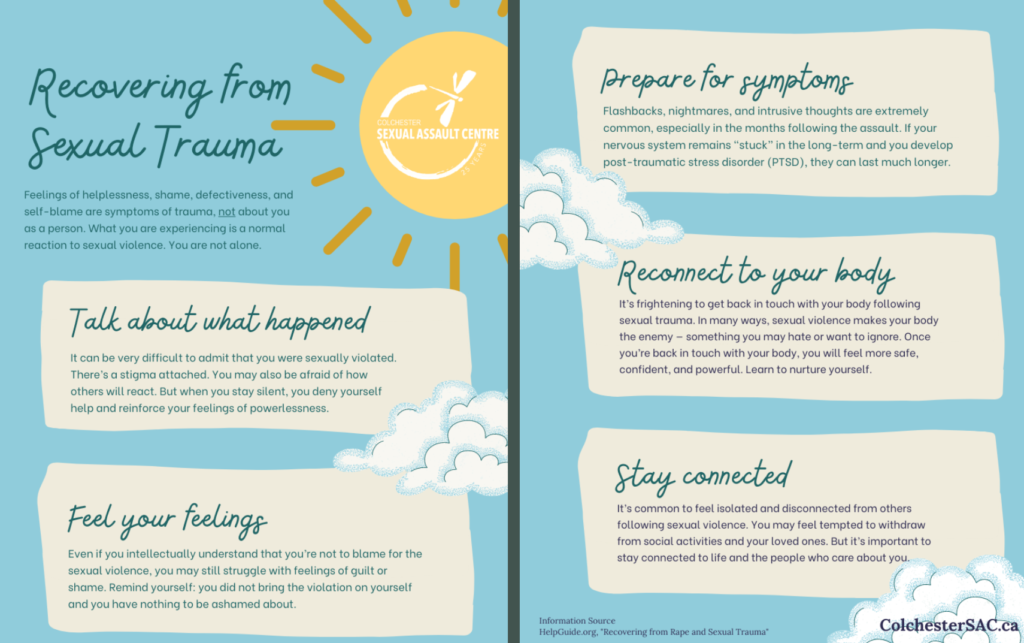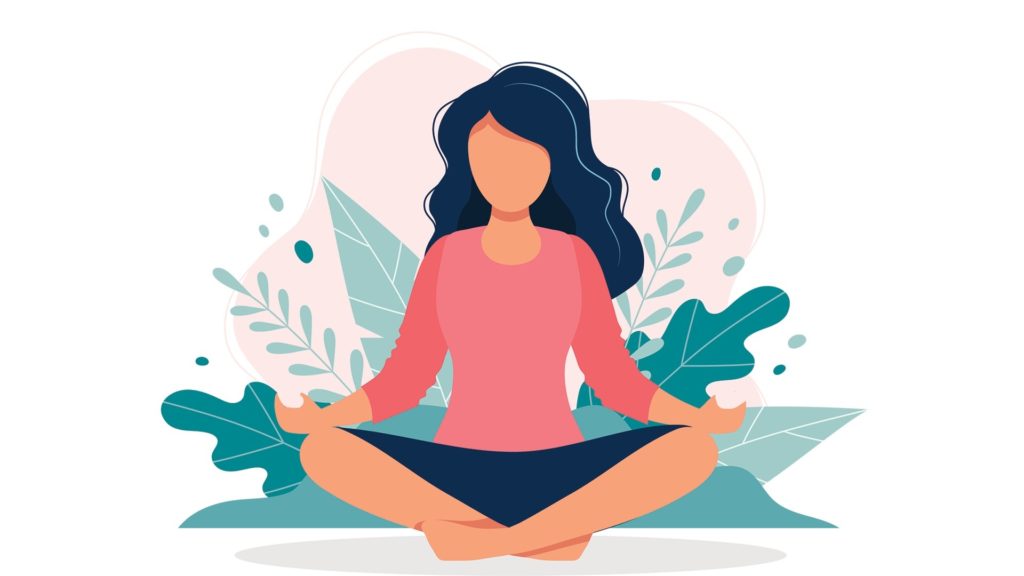Sexual violence is a crime that causes physical, emotional, and psychological trauma that can affect those impacted for years. It is a traumatic experience that can interrupt your life at home, work, school, and your relationships with family, friends, and coworkers.
In the first few days and weeks after an incident of sexual violence, it is common to want to forget it, put it behind you, and get on with your life. This can be complicated by feelings of shame or feeling that the incident could have been prevented.

You are not to blame for the sexual violence. And you are not alone.
You are experiencing trauma and it is possible for you to heal and recover. This process can be slow and confusing, but with understanding and persistence you can have control over how you heal. Support and reassurance from friends, family, or significant others (including counsellors, health professionals, spiritual leaders, and others impacted by sexual violence) can be immensely helpful during recovery.
You do not have to share your experience with others, only when you are ready. Choose those who will listen, support, and stand by your side.
For more information about trauma responses, different types of trauma, and how trauma affects the brain, visit our Trauma and the Brain page.
Things to reflect on after experiencing sexual violence

Get prompt medical treatment
Following sexual violence, it is important to seek medical treatment to check for injuries, pregnancy, and sexually transmitted infections. However, having a medical exam may seem overwhelming in the days after experiencing sexual violence. Consider the following:
- Take a trusted friend with you for support.
- Visit a SANE Nurse, who specialize in offering care to those impacted by sexual violence. Read more about the SANE program here.
- Talk with a friend or counsellor about your anxieties about seeking treatment.
- Assert control by requesting to see a healthcare professional of your preferred gender.
- Plan a self-care activity for after your appointment (warm bath, cup of tea, watching your favourite movie, taking a walk, meditating).

Build a circle of support
A support system is made up of people who provide support, respect, and care. These are people who do not judge, dismiss, or shame you. They provide genuine and compassionate feedback and have a positive impact on life. These people may include friends, family, acquaintances (including others who have been impacted by sexual violence), community members, and health professionals. Connecting with people who support you increases your emotional resilience, self-esteem, and self-acceptance. Consider the following:
- Make a list of all the people in your life then ask yourself the following questions: Do I trust this person? Do I feel respected by this person? Do I enjoy spending time with this person? Do I leave interactions with this person feeling positive and energized?
- Distance yourself from anyone who makes you feel negative, drains your energy, or asks too much of you.
- Ask for help. Reach out to mental health professionals and community organizations to learn about resources and services you can access, including support groups, healthy activities, and volunteer opportunities.
- Commit to making an effort to build a circle of support. It can seem intimidating to meet new people and try new things, but the rewards will be worth it.

Establish a self-care routine
Healing and recovery can mean different things for different people. You will probably have ups and downs, and you may feel frustrated for not recovering as quickly as others think you should. Remember, healing is not linear — you will likely experience ups and downs, breakthroughs and setbacks. Establishing a self-care routine can help you achieve a sense of consistency in your recovery. Consider the following:
- Be patient. Everyone goes through the healing process at their own pace.
- Believe in your strengths, admire your courage, and have hope for the future.
- Be gentle with yourself. Allow yourself more time to complete tasks and more time to rest.
- Develop positive affirmations to say to yourself daily.
- Spend time in nature — walk, sit, smell the flowers, feed the birds.
- Move your body — stretch, walk, exercise, do yoga, go skating.
- Give yourself permission to feel whatever emotions come up for you and allow yourself to cry. Emotions can be difficult, but they cannot hurt you. Avoiding them will keep them stuck in your body, whereas feeling them will allow them to release.
- Journal about your experience and feelings.
- Develop a mindfulness and/or spiritual practice — yoga, stretching, guided meditation, walking meditation, prayer, and progressive muscle relaxation.
- Maintain a regular eating and sleep schedule. A bedtime ritual (e.g. a cup of chamomile tea, skincare regimen, reading a book, sleep stories or meditation) can help let your body know it’s time to sleep. Take naps if you feel tired. It’s okay, you are healing.

Think about whether or not to report
It is your right to decide if and when you want to report the sexual violence to police. This is a very personal choice that no one can make but you. Staff at CSAC will support you in whatever choice you make about reporting or not reporting and in any choice you make about participating in the justice system after reporting. Consider the following:
- Reflect upon your own needs before making decisions about whether to report or not. Consider whether participation in the justice process will help or interfere with your healing and life goals.
- Speaking with police about sexual violence can be intimidating and traumatic. The primary role of police is to gather information and evidence for the purposes of doing a criminal investigation, not to provide trauma-informed support for those impacted by sexual violence.
- Familiarize yourself with the criminal process and statistics. A police investigation can take anywhere from a couple of days to several months, and any court proceedings that may result can be lengthy. Often people who report sexual violence describe feeling frustrated by and powerless over the justice system process.
- Reporting sexual violence to police may result in arrest and conviction, which could prevent the perpetrator from harming others.
- For more information, visit our page about reporting to police
External Resources:
Grounding Techniques — Mindfulness grounding techniques help orient you in the present moment when you’re experiencing overwhelm, panic, or anxiety.
Breathing Exercises — Mindfulness breathing exercises to help you relax and become centred.
Getting Started with Mindfulness — An introduction to mindfulness, including a variety of mindfulness and meditation practices to help you cultivate present moment awareness.
How to Release Anger: 11 Tips for Letting Go — Healthy ways to manage and express anger without using aggression.
Intimacy After Trauma [YouTube video] — In this TEDx Talk, intimacy expert, Dr. Kat Smith, shares her story of triumph over trauma. After childhood abuse and date rape, she was able to use her challenging life experiences to open up to the transformational power of love.
Chaos to Cartwheels: Sexual Trauma and the Light Through the Cracks [YouTube video] — In her courageous TEDx Talk, Liz Jordan shares her life experience in overcoming childhood sexual abuse and the resulting trauma. Her work to help others with similar experiences integrates yoga, meditation, and energy medicine to reveal a clear path to inner resources for daily living.
Sexual abuse and rape can be the making of you, not the breaking of you [YouTube video] — In this TEDxTalk, childhood sexual abuse survivor Lydia Ward hopes this emotional account of her personal journey can help to empower fellow survivors.
We Believe You: A colouring book for survivors and supporters [PDF] — This colouring book is an initiative of the Office of Sexual Violence Support and Education at Ryerson University in Toronto. Feel free to print and share the colouring book by posting your coloured images on social media with the hashtag #BreakTheSilenceNS.

